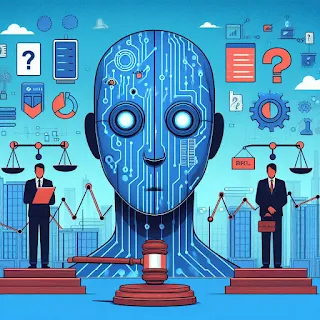In recent years, artificial intelligence (AI) and machine learning algorithms have become increasingly ubiquitous in our daily lives. From social media feeds to self-driving cars, algorithms are being used to make decisions and predictions that have significant impacts on individuals and society as a whole.
However, as algorithms become more pervasive, concerns are growing about the potential for "algorithmic bias" – the phenomenon where algorithms perpetuate and amplify existing social biases, leading to unfair and discriminatory outcomes.
In this article, we will explore the concept of algorithmic bias, its causes and consequences, and the ethical concerns it raises.
What is Algorithmic Bias?
Algorithmic bias refers to the phenomenon where algorithms, often unintentionally, perpetuate and amplify existing social biases. This can occur in a variety of ways, including:
- Biased data: Algorithms are often trained on large datasets that reflect existing social biases. For example, a facial recognition algorithm trained on a dataset that is predominantly white may have difficulty recognizing faces of people of color.
- Biased design: Algorithms can also be designed with biases built in. For example, a hiring algorithm that prioritizes candidates with certain educational backgrounds or work experience may inadvertently discriminate against candidates from underrepresented groups.
- Lack of transparency: Algorithms can be complex and difficult to understand, making it challenging to identify and address biases.
Causes and Consequences of Algorithmic Bias
Algorithmic bias can have serious consequences, including:
- Discrimination: Algorithmic bias can perpetuate and amplify existing social biases, leading to discriminatory outcomes. For example, a biased hiring algorithm may discriminate against candidates from underrepresented groups.
- Inequality: Algorithmic bias can also perpetuate and amplify existing social inequalities. For example, a biased algorithm used to determine access to credit or housing may perpetuate existing inequalities in wealth and access to resources.
- Lack of accountability: Algorithmic bias can also make it difficult to hold individuals and organizations accountable for their actions. For example, a biased algorithm used to determine guilt or innocence in a criminal trial may make it difficult to hold prosecutors and judges accountable for their decisions.
Ethical Concerns Raised by Algorithmic Bias
- Algorithmic bias raises a number of ethical concerns, including:
- Fairness: Algorithmic bias can perpetuate and amplify existing social biases, leading to unfair and discriminatory outcomes.
- Transparency: Algorithmic bias can also make it difficult to understand how decisions are being made, leading to a lack of transparency and accountability.
- Accountability: Algorithmic bias can also make it difficult to hold individuals and organizations accountable for their actions.
Addressing Algorithmic Bias
Addressing algorithmic bias requires a multifaceted approach that includes:
- Data auditing: Regularly auditing datasets for biases and ensuring that they are representative of diverse populations.
- Algorithmic transparency: Making algorithms transparent and explainable, so that decisions can be understood and challenged.
- Human oversight: Implementing human oversight and review processes to detect and address biases.
- Diversity and inclusion: Ensuring that teams developing and deploying algorithms are diverse and inclusive, and that they prioritize fairness and transparency.
Conclusion
Algorithmic bias is a serious concern that requires immediate attention. As algorithms become increasingly ubiquitous in our daily lives, it is essential that we prioritize fairness, transparency, and accountability. By addressing algorithmic bias, we can ensure that algorithms are used to promote social good, rather than perpetuate existing social biases.










0 Comments